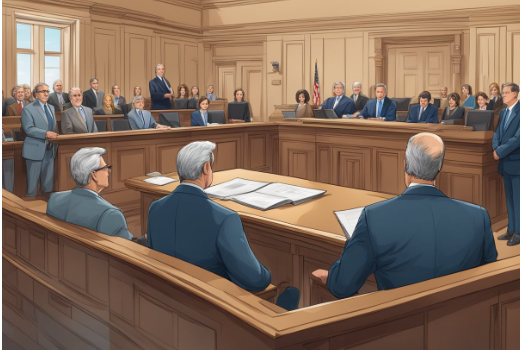Big Jury Awards for Personal Injuries: Understanding the Factors at Play
Navigating a personal injury claim can be daunting. This is especially true when it comes to understanding the potential outcomes. One important aspect of these cases is the jury award, which can sometimes be quite large.
Big jury awards in personal injury lawsuits can make a significant difference in the lives of those who have suffered losses. They help to cover medical bills, lost wages, and provide a sense of justice.
When pursuing a personal injury lawsuit, guidance from an experienced personal injury lawyer is crucial. They can help ensure that you present a strong case, capable of convincing a jury to award substantial compensation.

The influence of a well-presented case on the jury can lead to surprising outcomes. By covering key areas and effectively showcasing the impact of the injury on your life, a jury may decide on a substantial award in your favor. Understanding how these awards work and what factors contribute to their size can be essential in your legal journey.
Understanding Personal Injury Claims
When dealing with personal injury claims, there are important aspects to consider. Damages awarded can vary based on what’s proven during a case. Also, understanding negligence is crucial, as it often determines the outcome.
Types of Damages in Injury Cases
In personal injury cases, compensatory damages aim to cover actual losses. These include medical costs, lost earnings, and emotional distress.
For example, if you’re injured in a car accident, these damages might cover medical bills and missed work.
Additionally, punitive damages might be awarded. These are not tied to actual losses but serve to punish the wrongdoer. They can be seen in cases of extreme negligence or intentional harm.
Injury settlement amounts often reflect these damage types. Settlements may offer a sum that accounts for both compensatory and punitive damages, avoiding the need for a trial. Settlements are often preferred due to their faster resolution and certainty compared to a jury verdict.
The Role of Negligence in Personal Injury
Negligence plays a key part in personal injury claims. It refers to someone’s failure to act with reasonable care, causing harm to another person.
Proving negligence involves showing that the defendant had a duty, breached that duty, and directly caused the injury.
For example, in a slip and fall case, the property owner might be negligent if they didn’t fix a known hazard. Your personal injury verdict could rely heavily on demonstrating this negligence.
Understanding how negligence impacts a case helps in evaluating potential personal injury settlements. Strong evidence of negligence can lead to higher injury settlement amounts or trial verdicts. The severity and clarity of negligence often influence the strategy used in these scenarios.
Major Factors Influencing Jury Awards
Several elements impact the size of jury awards in personal injury cases. Economic and non-economic damages are evaluated, considering both immediate costs and long-term effects. Pain and suffering also play a crucial role in determining compensation.
Economic Versus Non-Economic Damages
When assessing jury awards, you must consider economic damages like medical expenses and lost income. These are straightforward costs associated with the injury.
Non-economic damages, such as pain and suffering, are trickier. These involve emotional distress and reduced quality of life.
While they’re harder to measure, they hold significant weight in compensation. Both types of damages need careful examination to understand their influence on the final award.
Impact of Long-Term Injuries
Long-term injuries significantly affect jury awards. Conditions like spinal surgery or a traumatic brain injury can lead to extended medical treatment and ongoing care. Your ability to work may also be impacted, resulting in lost income over time.
Juries consider the potential for permanent disability and how it shapes your future. The possibility of an ongoing need for medications, therapy, or specialized equipment is also assessed. These factors can increase the compensation significantly.
Calculating Pain and Suffering
Calculating pain and suffering involves assessing the injury’s impact on your daily life. This may include soft tissue injuries or neck or back injuries that hinder your activities.
Juries evaluate the subjective nature of these damages by considering your medical records, pain level, and lifestyle changes.
Evidence from medical experts can support your claims, highlighting the physical and emotional toll of the injury. This analysis helps in arriving at a fair compensation amount.
High-Profile Personal Injury Cases
In recent years, some personal injury cases have captured national attention, shedding light on legal precedents and the role of public opinion. These cases often involve big companies, significant jury awards, and critical health issues.
Case Studies and Legal Precedents
In personal injury law, specific cases have established important legal precedents. Notably, cases involving General Motors highlighted vehicle safety flaws. High jury awards were given to victims affected by negligence in design.
Another significant area is asbestos exposure, leading to lung cancer cases. Many companies faced lawsuits, with courts frequently awarding large settlements.
In addition, claims involving products causing ovarian cancer have influenced legal strategies and outcomes. These cases focused on proving links between products and diseases, often requiring substantial medical evidence.
These examples show how verdicts can set standards that affect future cases and corporate practices.
Influence of Media and Public Perception
The media plays an important role in shaping public perception of high-profile cases. News coverage can sway public opinion, impacting the trial and jury decisions. This is significant in cases involving large companies and medical issues.
Media attention often zeroes in on the human impact, such as long-term medical care and costs faced by victims. Highlighting personal stories can amplify the perception of negligence and
sway public empathy.
Understanding these dynamics is essential, as they can influence both court outcomes and company reputations. Public perceptions, shaped by the media, can have lasting effects beyond the courtroom.
Finding the Right Personal Injury Attorney
Selecting the best attorney is crucial for achieving fair compensation for personal injury claims. A good lawyer should possess specific qualities and guide you through the selection process effectively.
Important Qualities and Credentials
Look for a personal injury attorney with a strong track record in winning cases similar to yours. It’s vital to check if they specialize in personal injury claims. Their experience can greatly impact the outcome of your case.
Check for licenses and certifications, such as membership in respected legal organizations. These can serve as a trust signal that the attorney has recognized expertise.
Good communication is key. Your attorney should explain complex terms in simple ways and be available to answer questions. A responsive lawyer can make the process smoother and less stressful for you.
How to Navigate the Attorney Selection Process
Choosing the right attorney, can feel overwhelming, but with a clear approach, you can make an informed decision. Start by seeking recommendations from trusted family members or friends who have faced similar legal situations. Additionally, explore online reviews and testimonials to gain insights into the experiences of past clients.
Next, schedule initial consultations with a few attorneys. These meetings are often free and provide a valuable opportunity to assess whether the lawyer is the right fit for your needs.
During these consultations, ask key questions about their strategy for your case, their fee structure, and their track record with similar cases. Pay attention to how they communicate and whether they instill confidence in their ability to handle your case effectively.
Ultimately, choose an attorney, like a skilled Duluth injury lawyer, who not only has the expertise but also makes you feel supported and assured throughout the legal process.
Frequently Asked Questions
Big jury awards in personal injury cases often involve multiple factors such as the calculation methods for settlements, notable legal precedents, and strategic approaches. Examining recent significant settlements can provide insight into what contributes to large awards.
What factors contribute to large personal injury settlements?
Large settlements often result from severe injuries that lead to high medical costs and long-term impacts on your life. Additional factors may include lost wages, the defendant’s liability, and the skill of your legal team.
How are personal injury settlement amounts typically calculated?
Settlement amounts are typically calculated based on the severity of injuries, medical expenses, lost income, and pain and suffering. Your lawyer may also consider future medical needs and any impact on your quality of life.
What legal precedents exist for substantial punitive damage awards in personal injury cases?
Significant precedents often involve cases where the defendant acted recklessly or with intent to harm. Courts may award large punitive damages to deter similar conduct. These awards are less common than compensatory damages.
What steps are involved in achieving a million-dollar lawsuit settlement for personal injury?
Achieving a million-dollar settlement usually requires thorough documentation of your injuries, a skilled legal team, and possibly expert testimony. Negotiations between your lawyer and the defendant’s representatives are essential.
What legal strategies are employed to win significant jury awards in personal injury lawsuits?
Successful strategies often include comprehensive evidence gathering. Expert witnesses and demonstrating the defendant's liability are also crucial. Skilled negotiation and a persuasive presentation of your case in court play a crucial role.











